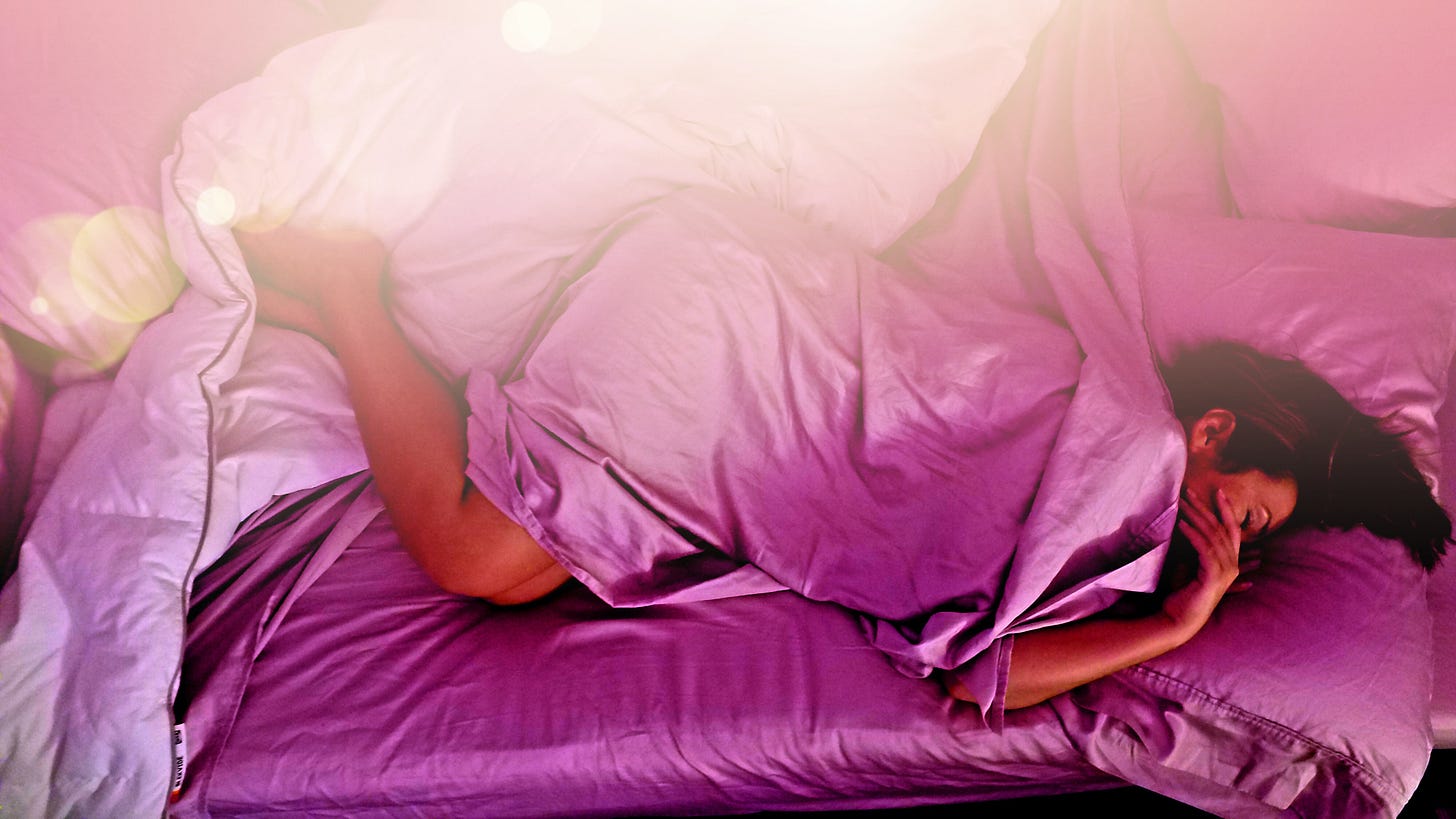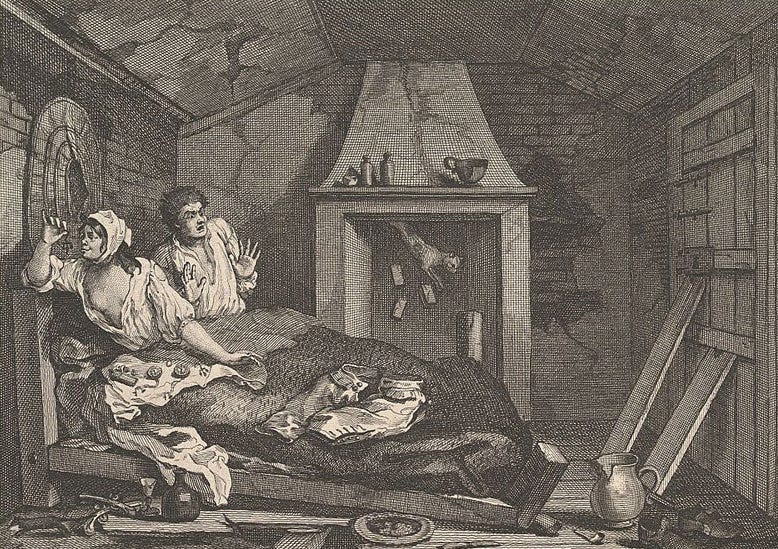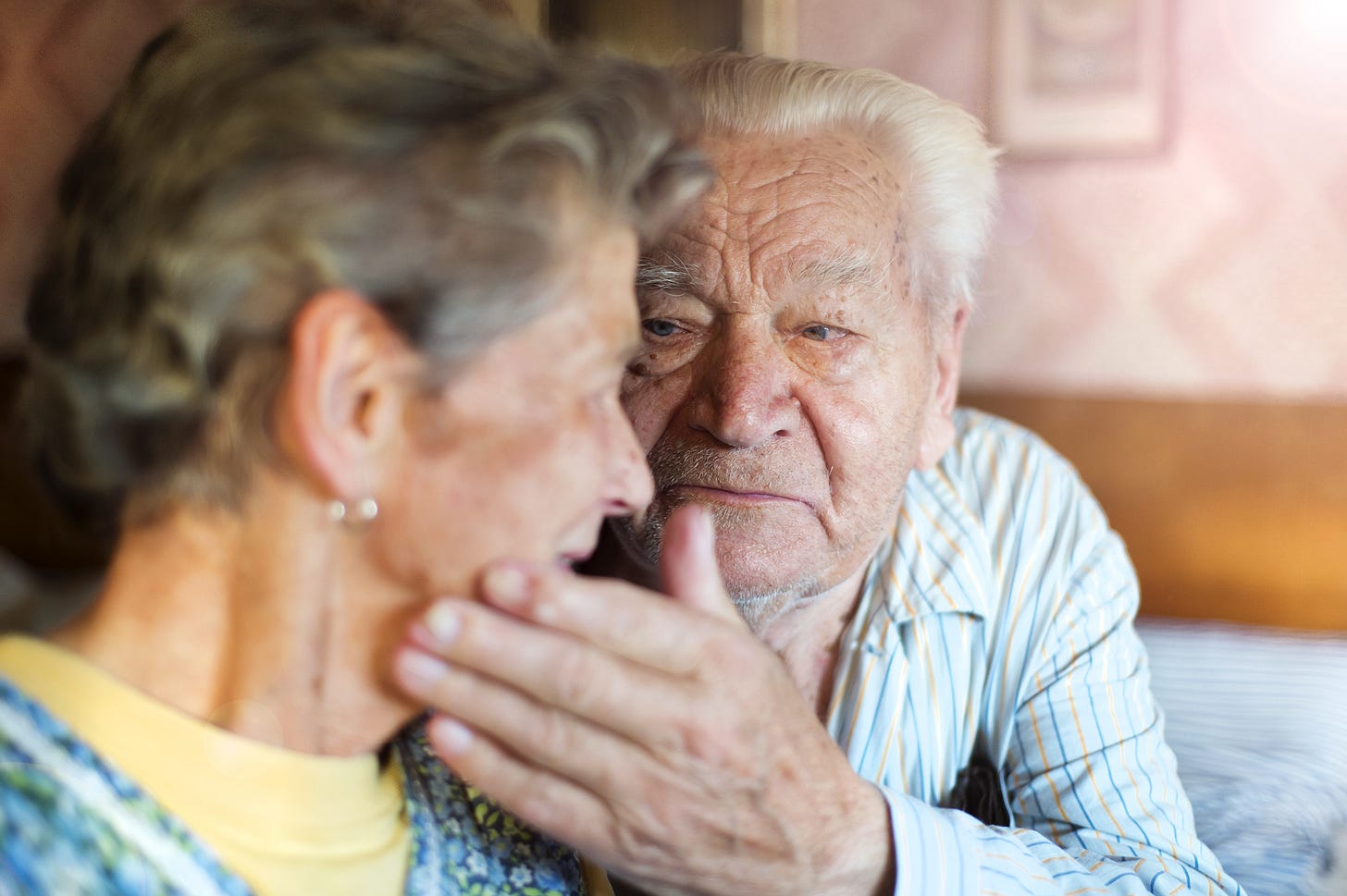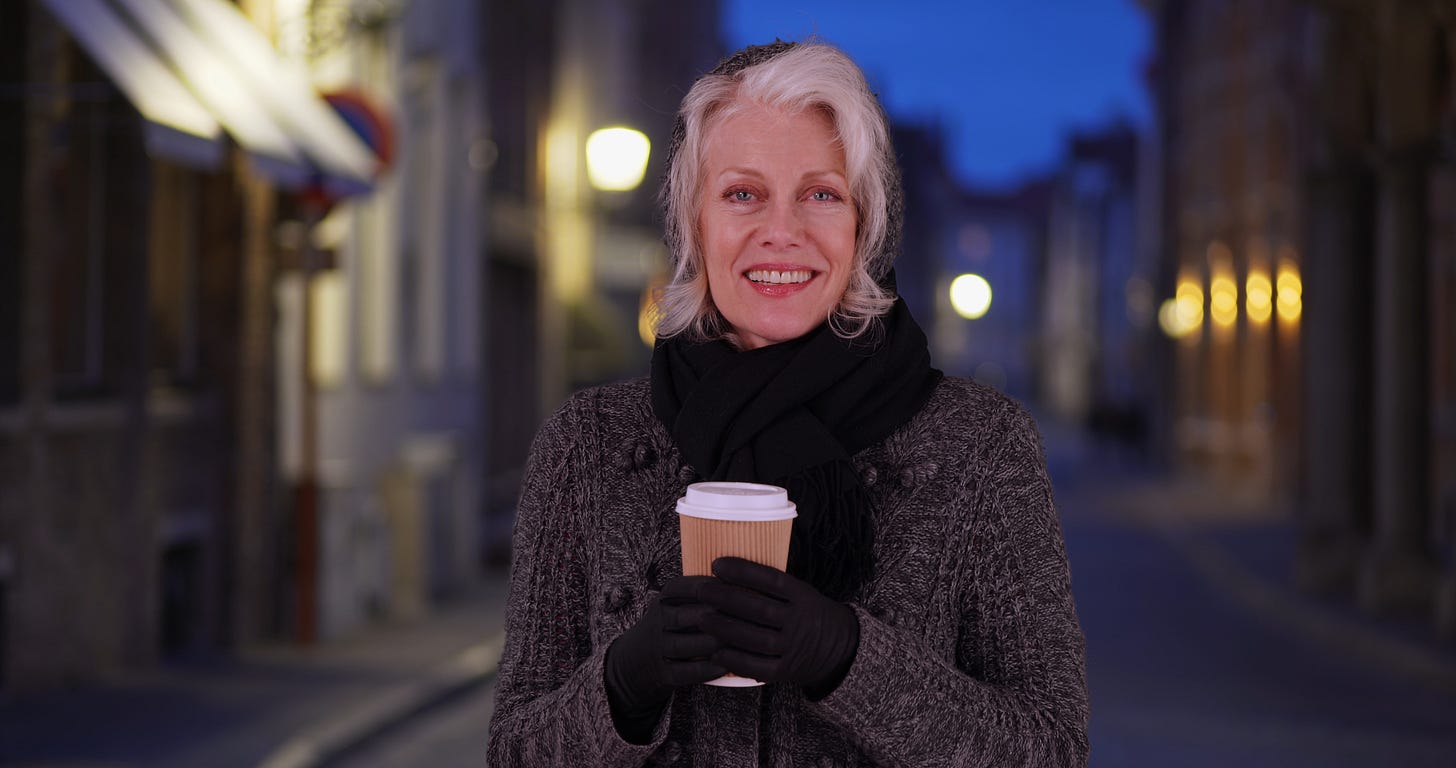Things To Do At 3:00 A.M.
What are YOU doing in the middle of the night?
My guess is it’s 3:00 a.m. and you are reading this article. Perfect.
Why the hell do all of us old broads wake up in the middle of the night? And why can’t we get back to sleep? That’s one of the age-old mysteries of menopause and the years beyond.
Remember all those childhood fables about old women creeping around in the dark of the night, noctambulating as they called it in the Victorian Age? Great word that. Noctambulating. And who could forget Hamlet’s mother, Lady Macbeth? While everyone else was sleeping, she was stumbling about a dark castle mumbling things like “out damn’d spot.”
Anyone else have memories of waking up at your granny’s and finding her standing over the bed? And was she just staring at you? Now that was creepy as all get out, especially when you were sleeping in that dark middle bedroom that had a picture of the Ten Commandments eerily illuminated by the nightlight. I would fall asleep wondering “what the hell is ‘adultery?’” (and yes, I was swearing even back in grade school). Since my parents never took us to church, the concept of “adultery” was a disturbing mystery, one I couldn’t quite sort out until college as we were still in the Pre-Google Epoch. Granny always reiterated that I had to ask for forgiveness for all of my sins (each and every last one apparently) if I wanted to get into heaven. For years I couldn’t figure out whether I’d committed “adultery.” Would I end up in hell or just limbo? The constant worry of this kept me up many a night.
Fortunately, after her noctambulating, Granny would return to normal in the morning, toiling away in the kitchen making soft boiled eggs and Roman Meal toast with strawberry jam. But in the middle of the night… yikes! Who knew what she was up to. It really gave me the heebie jeebies, her floating around in that luminescent night frock.
And now here we are, in 2023, dare I say 50+ years later? We are now Granny’s age. And now it’s YOU that’s waking up at 3:00 a.m. and doing weird shit around the house, your iPhone screen glowing through your bralette as it periodically gives you IG updates while you do your nocturnal mopping. We never did figure out why Granny was up in the middle of the night, but why are you?!
That’s what we’re here to explore. It needs sorting out.
What causes wakefulness in the middle of the night?
World-renowned Yale Medicine devotes all of 242 words to the issue of menopause-related sleep loss. Don’t knock yourself out, YALE. The gist: “As a woman nears menopause, her hormone levels fluctuate dramatically, causing night sweats and hot flashes, which can wake the brain during sleep. In addition, lower levels of progesterone make some women irritable and less able to relax.” And… “Research also suggests that progesterone and estrogen may protect women against sleep apnea, but menopause cancels out that benefit.” Yale’s 3-step program for remedying these problems is super easy: eat soy products, don’t eat spicy food and wear lightweight clothing to bed. I’m down for that.
But guess what? That Yale plan doesn’t work for everyone. It sure didn’t work for me. The only thing I wasn’t doing already was avoiding spicy food. I was doing the work… I was sleeping buck naked and downing plenty of soy milk with my granola. But I was still waking up! WTH.
There are a mind boggling number of articles on the subject of sleep patterns during menopause and post-menopause and on issues of sleep deprivation and its effect on overall health and mental well-being. Suffice to say that each article seems as dull and useless as the next, and most of those perused were written by major medical institutions and foundations. And while I am generally a huge fan of these organizations, it really seems like they need to get on the same page on these issues, especially as relates to the health of older women, an area vastly underrepresented in medical literature from my observations. Most annoying to me are the overly simplified recommendations for resolving sleep deprivation.
Most common recommendations for improving sleep…
• No late afternoon naps
• No TV, phone or computer in your bedroom
• Not too warm in your bedroom
• No bright lights in the evening
• No large evening meals
• No exercising before bed
• No caffeine in late afternoon or evening
• No weed or edibles
• No alcohol
As you can plainly see, there aren’t any what-to-do’s, just a lot of what-not-to-do’s. As in: not terribly helpful.
My noctambulating (middle of the night strolls/wakefulness) started after my son was born, at which time I was 37. I know… not menopause, but stay with me on this, as my point is related to being awake in the middle of the night and figuring out how to handle it.
My baby boy wanted to nurse at exactly 3:00 a.m., every night, like clockwork. Since I was not good with the concept of letting my child cry himself to sleep, I would just cue up an episode of Law and Order and we’d get down to business. A half hour later he was cashed out for the rest of the night. I would keep snuggling him until Jack McCoy buttoned up his trial and the bad guy was in jail, then I’d lay him in his bassinet.
Afterward, however, I was WIDE AWAKE. And there was no way I was going to just lay there in bed doing jackshit for a couple of hours. Keep in mind, this was pre-smartphones, so there was no entertaining myself with Netflix, NY Times crosswords and the like. So, I would get up, throw in a load of laundry, clean out the fridge, wash dishes, make sandwiches for the week, compile my grocery list and sometimes I would even venture out into the darkness to gas the car and run it through the carwash. Imagine that… no waiting in line! So cool. After efficiently completing what would typically have been a half day’s housework, I would then crawl back into bed and sleep for another 3+ hours. And it was a good sleep. Peaceful and without worry. I’d gotten things organized, buttoned up the bills for the week, I’d made my to-do lists. I’d vacuumed out my brain.
And when I woke up for the second time, I felt remarkably fresh and alert. What a great surprise it was to find the house clean, laundry done, food prepped and the car gleaming. I’d almost forgotten what I’d done. It was like the hausfrau fairy had dropped by in the middle of the night. Now that was a great way to start my day. It meant I could focus my attention on my son, the work day ahead and whatever else was on my schedule. No scrambling. No brain fog.
Did I ever consider this odd schedule an issue, this waking up in the middle of the night? Absolutely not. I accepted that this rhythm was the way things needed to be in my life. And so I adjusted everything to accommodate that. Chalk this up to my being the product of an artist/hippy parent and having been taught the ways of the world by my naughty aunt with the outdoor shower. Therein you have the reasons I didn’t think twice in making these adjustments. I was a NONCONFORMIST. I invite you to join the club.
Not only did I come to enjoy this unique sleep/wake pattern while my son was small, but I continued in that rhythm (with slight adjustments) for most of my life. I found that breaking up my sleep into two large chunks (5 hrs. + 2.5 – 3 hours) gave me more clarity throughout the day and especially in those early morning hours. I had also made a habit of cuing up tasks and creative work in smaller bites, and found that in doing so I was actually accomplishing more and my work was of a higher quality and more precise. Most importantly… this routine made my life much less stressful. When I was wakeful, I did things. When I was tired, I allowed myself to sleep.
Though some friends and family thought this odd, here’s my perspective: I was paying attention to my body’s signals and that was good. In return, my body rewarded me by staying strong and keeping my mind sharp. Sadly, somewhere along the way I fell off on this routine, until recently. It was a revelation bringing it back.
Now stay with me. I’ll be returning to these thoughts shortly…
Is there an optimal sleep/wake schedule for older women?
No. The reality is we are all very different. We have different genetics, are from varied cultures and religions, we eat unique combinations of foods, some of us live in cities, others in the countryside, we come from all walks of life and we pursue or have pursued a variety of occupations. How could there possibly be one right way of doing things? And consider this: as we get older, those differences have grown, multiplied by the number of years we have taken on our divergent paths.
The bit we do have in common is our need to sleep well and that means 7 to 9 hours of quality sleep per 24-hour period. Dr. Michael Twery, a sleep specialist with the National Institute of Health says this: “Sleep affects almost every tissue in our bodies. It affects growth and stress hormones, our immune system, appetite, breathing, blood pressure and cardiovascular health.”
Lack of sleep increases your risk of…
• Type 2 diabetes
•. High blood pressure
• Obesity
• Sleep apnea
• Vascular disease
• Accidents related to fatigue
• Stroke
• Heart attack
• Depression
• Anxiety
In later life it is not just changing hormones that affect our sleep, it can be any number of factors, so know that hormone replacement therapy is not a cure-all for women’s sleep issues.
Other factors that impact sleep quality…
• Chronic pain
• Arthritis
• All manor of sleep disorders (sleep apnea, restless leg syndrome, etc.)
• Irritated skin
• Recovery from surgeries
• Loss of a spouse
• Situational anxiety
• Medications
• Digestive issues
• Acid reflux
• Asthma
• Multiple schlerosis & Parkinson’s
• Bladder issues
• ETC.!
Because of this, it is incumbent on all of us to determine which things specifically are affecting our sleep and to make the necessary adjustments to our lifestyle and sleep routines that will affect positive change. THE GOAL: get a proper amount of deep sleep every single day.
What is deep sleep?
Deep sleep is the slow-wave sleep that is the third part of the non-rapid eye movement phase and it occurs during the first 70 - 90 minutes of our falling asleep. It’s almost as if our body wants to make sure we pack this in. During deep sleep, our bodies release growth hormones, which are critical toward building and repairing all aspects of our body and mind… muscles, bones, tissue, etc. These growth hormones are essential for physical and intellectual efficiency and are much reduced in older adults. Perhaps this explains older women’s need for multi-phasic sleep, whereby their bodies are releasing growth hormones more than once over the course of a day.
TRENDING: Biphasic Sleep
While biphasic sleep is nothing new, it has recently become a popular topic of conversation, especially among older adults. For those of you out-of-the-loop on this, biphasic sleep (also called segmented sleep) is simply a pattern of breaking your sleep into two segments. Most of us who have raised children were forced into biphastic sleeping as a matter of course, especially when our children were infants, but many folks have always done it, kids or no. And if you peruse the history books, you’ll find that this was the way to do things back in days of yore. There’s a fascinating segment on this phenomenon called The Forgotten Medieval Habit of “Two Sleeps,” produced by the BBC.
Biphasic sleep can take a couple of forms. There is the “first sleep, second sleep” version in which the 7 to 9 hours of sleep are divided into two large chunks. In this scenario there is a good-sized break in between, which is a period of wakefulness and activity. This is the type of biphasic sleep I referred to in the anecdote about my infant son. There is also the “siesta/napping” version, which is typically a 5 to 6 hour stretch at night followed by a mid-day 90+ minute nap. Both of these versions ensure you get the full amount of rest needed for a healthy body while at the same time providing you with two periods of “deep sleep” — that slow wave period where your growth hormones are released. Since we have less of these hormones in our old age, you can understand how this type of sleeping might be advantageous.
Advantages to biphasic sleep & getting up at 3:00 a.m.
• Moving to stimulate circulation
• Taking needed medications
• Stretching, icing/heating, massaging, etc. to alleviate pain or stiffness
• Re-hydrating
• Getting a bit of work done while your mind and body are fresh
• Doing a set of post-surgery physical therapy exercises
• Journaling after dreaming to work on sources of anxiety
• Adjusting your sleep environment (temp, bedding, lights)
• And more!
OR you could just lie in bed and ruminate. Your choice.
Start getting creative
My feeling… you might as well try doing something new if your sleep is compromised night after night. In addition to all the standard protocols listed above, there are many other ideas out there, things you may not have thought of.
I LOVE the book Happiest Baby On The Block, by Dr. Harvey Karp. I’ve actually tried some of his techniques and they work! Dr. Karp’s 5 S’s: swaddle, shush, side or stomach, swinging, suck. He also recommends skin-to-skin contact. Have to admit I’m a bit embarrassed to discuss any of this in too much detail, but suffice to say I came up with an adult version for most of his recommendations. This involved getting one of those full body pillows, tucking myself in tightly with my comforter, doing a bit of rocking, etc. I found this very soothing indeed and if it had been an especially stressful day, these techniques worked like magic. Dr. Karp calls these S’s a “symphony of sensations” that recreates the experience of being in the womb. Very primal.
One complaint I’ve heard many friends make is that they feel hypervigilant at night. Every noise puts them on high alert. Is there an animal in the backyard? Is someone coming through the front door, is that branch going to break a window? Night anxiety is a thing, especially as we get older. Our mind is aware that we are less physically capable of defending ourselves, so in essence it is providing a normal response to our fears. In the caveman days, I’m sure the older Neanderthals had no choice but to be hypervigilant at night or end up DEAD.
Your variation on a solution to night anxiety will likely be different than mine, but here’s my routine… I make a full sweep of the house. I close all curtains, check all the locks, make sure windows that were open during the day are shut and secured and I turn on my security lights. I also leave a few random lights on in the house to give the impression someone is up and about. Many folks also have a security system and that is great, too. Once I’ve done my routine, I sleep like a baby. On nights I forget to do it, I invariably wake up.
Many people find they can’t sleep for what I call “racing thoughts.” There are so many things to remember and take care of: family problems that need resolving, financial and health issues, etc. How can one sleep when there are so many unanswered questions? Best thing to do is to WRITE THINGS DOWN. Have a notepad on your nightstand and before you even try to sleep, brainstorm, write lists, bitch about someone who made you upset, write reminders about bills and appointments. Then let it go. It will be right there when you wake up in the morning, in your notebook, ready to be dealt with.
Other comforting routines can include breathing exercises, gentle stretching, soothing lotions and of course loose, soft nightwear. Scented oils, gentle music or podcasts are other nice touches that can draw you into a deep sleep. Some people enjoy reading before bed, I often thumb through books on art.
And for many folks SEX IS GREAT. Nothing like a you-know-what to shut down your lateral orbitofrontal cortex (the logical part of your brain) so you can quit thinking about your mortgage and taxes. Add to that a nice shot of oxytocin and dopamine. Trust me on this… you will be floating in the clouds.
Where to go from here…
Improving your sleep routine comes down to accepting how you are now and then working toward solving or at least improving on the unique issues that are keeping you awake, be they physical or mental.
Take time to EXPERIMENT. Try out some new routines, discover the things that bring you comfort and help you to relax. And give yourself permission to sort out life’s problems only during the hours you are lucid and well-rested. That way you can confidently set aside your worries for the night.
Above all else, if you have health issues that affect your sleep, take time to work them out with your doctor. And accept that regular visits to the doctor are the new normal as you get up in years.
In my journey toward healthful sleep, it was finally getting a hip replacement that transformed my life — not only in restoring my mobility during the day, but in alleviating my nightly tossing and turning from discomfort. Since the surgery, I have experienced my most restful sleep ever. It took me SIX YEARS to get to a place of accepting what needed doing. Don’t wait like I did.
GOOD READS:
The Extraordinary Importance of Sleep / National Library of Medicine
What Are Sleep Disorders? / American Psychiatric Association
The Forgotten Medieval Habit of “Two Sleeps” / British Broadcasting Company
Sleep Disorders / Anxiety & Depression Association of America
Increasing Physical Activity May Improve Sleep For Menopausal Women / American Academy of Sleep Medicine
Why Do I Feel More Anxious At Night? / New York Times
8 Ways To Quiet Your Mind and Sleep Better Tonight / University of North Carolina
What is Biphasic Sleep and Is It Healthy for Humans? / Good Housekeeping
Meet Me at 3:00 a.m. for a Cup of Coffee / New York Times
Menopause and Sleep / The Sleep Doctor
Biphasic Sleep / The Sleep Doctor
What is Biphasic Sleep? / The Sleep Foundation
Here’s Why You Keep Waking Up At 3:00 a.m. / Hella Health
What is Biphasic Sleep and Should You Try It? / Humana
Women, Are Your Hormones Keeping You Up At Night? / Yale Medicine
Can’t Sleep? Treat Yourself Like A Baby / New York Times
How Harvey Karp Turned Baby Sleep Into Big Business / New York Times
A Good Night’s Sleep / National Institute on Aging
Hot Flashes, Night Sweats, and Menopause / Verywell Health
What Happens During Deep Sleep? / Verywell Mind
The Neurobiology of Slow Wave Sleep / National Library of Medicine
A MUST READ:
Why We Sleep, Matthew Walker, PhD














Fantastic report! Morning light and stretching at night really help me